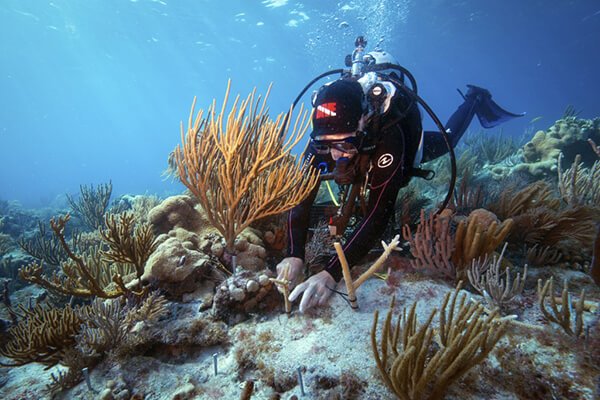
A diver outplanting staghorn coral. (Image Credit: Reef Resilience Network)
Florida’s coral reefs are in critical danger due to extreme heat and have been damaged by hurricanes, humans, and diseases. And all those corals could die off if more heat waves emerge. Conservationists have taken out parts of coral reefs from the oceans to move them elsewhere for restoration. For example, the non-profit Coral Restoration Foundation (CRF) is helping with this mission and runs coral-growing nurseries in the Florida Keys.
So far, CRF has mass-migrated colonies from its underwater nurseries to land-based ones that can protect them against those elements. Their efforts involve rescuing two important species: Staghorn and Elkhorn corals that were already bleached. These corals are sent to various aquariums and labs in Florida. The Keys Marine Lab takes in over 3,000, placing them inside quarantine tables before they’re housed in tanks.
Sadly, 50% of coral reefs at the CRF’s nurseries died due to the intense heat waves that hit Florida over the summer. Despite that drawback, the team is evaluating those that survived --- either at the lab or in the ocean. These can help them figure out the next phase to tackle, especially because the ocean is cooling down. Besides, corals could become resilient and adapt to harsh environments, so they should return to their natural habitat.

Star coral, which was outplanted, growing at Looe Key Reef. (Image Credit: Greg McFall/NOAA)
More coral migrations might be needed next year, and Key Marine Lab is prepared. It has already started gathering resources for future heat waves. After growing the corals, the team replants them and uses a special technique to track their restoration progress. With a GoPro, they captured images of the coral reef and then produced a 3D model of it. This allows the team to keep an eye on newly planted coral reefs like Elkhorns that will eventually grow into bigger colonies. They also expect branches to fuse, leading to a strong lattice-like structure.
The Reef Institute is also joining forces to save the corals. It’s a restoration facility that corals are sent to, and some stay there permanently. Each fragment of a coral represents the home for tiny species. Even though individuals die off, the colony thrives by reproducing. This works like a bonus because if things don’t work out in the oceans, the facility can just start over by growing new colonies from fragments. And those can be put back into the ocean to thrive. Additionally, corals reproduce through a spawning process. If controlled, conservationists can use it to create healthier coral reefs that adapt to extreme heat.
Saving coral reefs isn’t quick and easy. Humanity must help by reducing CO2 and temperatures so that coral reefs have a better chance of growing in the oceans. “We hope the Mission: Iconic Reefs effort can be beneficial not just in the Florida Keys,” says Sarah Fangman, Florida Keys National Marine Sanctuary superintendent, “but also in other reefs around the world. We hope we can give back and pay it forward.”
Have a story tip? Message me at: http://twitter.com/Cabe_Atwell
